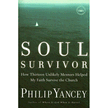
Give me, O Lord, a fear, of which I may not be afraid.
Although Devotions does not answer the philosophical questions, it does record Donne's emotional resolution, a gradual movement toward peace. At first - confined to bed, churning out prayers without answers, contemplating death, regurgitating guilt - he can find no relief from fear. Obsessed, he reviews every biblical occurrence of the word fear. As he does so, it dawns on him that life will always include circumstances that incite fear: if not illness, financial hardship, if not poverty, rejection, if not loneliness, failure. IN such a world, Donne has a choice: to fear God, or to fear everything else.
In a passage reminiscent of Paul's litany in Romans 8 ("For I am convinced that nether death nor life...will be able to separate us from the love of God..."), Donne checks off his potential fears. Personal enemies pose no ultimate threat, for God can vanquish any enemy. Famine? No, for God can supply. Death? Even that, the worst human fear, offers no final barrier against God's love. Donne concludes his best course is to cultivate a proper fear of the Lord, which fear can supplant all others: "as thou hast given me a repentance, not to be repented of, so give me, O Lord, a fear, of which I may not be afraid." I learned from Donne, when faced with doubts, to review my alternatives. If for whatever reason I refuse to trust God, what, then, can I trust?
In his disputation with God, Donne has changed questions. He began with the question of cause - "Who caused this illness, this plague? And why?" - for which he found no answer. The meditations move ever so gradually toward the question of response, the defining issue that confronts every person who suffers. Will I trust God with my crisis, and the fear it provokes? Or will I turn away from God in bitterness and anger? Donne decided that in the most important sense it did not matter whether his sickness was a chastening or merely a natural occurrence. In either case he would trust God, for in the end trust represents the proper fear of the Lord.
1 comment:
btw Kim, I tagged you, and it's about books!
Post a Comment